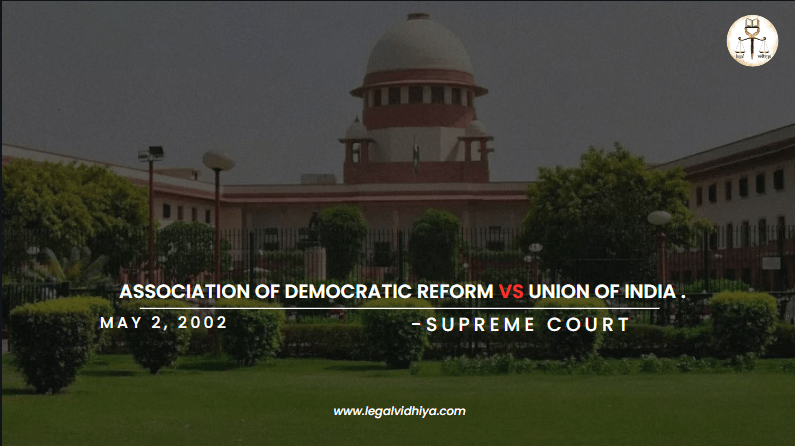
| CITATION | 2002 (3) SCR 294 |
| DATE OF JUDGMENT | May 2, 2002 |
| COURT | Supreme Court of India |
| APPELLANT | Democratic reform |
| RESPONDENT | Union of india |
| BENCH | Justice M.B. ShahJustice Arijit PasayatJustice Brijesh Kumar |
INTRODUCTION
The case of Association of Democratic Reforms vs Union of India is a landmark case concerning transparency in Indian politics and electoral processes. It revolves around the disclosure of criminal antecedents, financial details, and educational qualifications of candidates contesting elections. This report takes you into details of the case, including its background, facts, legal issues, arguments presented by both parties, the judgment rendered by the court, and its implications.
FACTS OF THE CASE
- Democratic reforms filed a petition in Delhi high court regarding the electoral process in India.
- The democratic reform wanted the process to be more transparent
- The reform gave several suggestions which were given by the law commission and wanted the election commission to take them seriously
- The main suggestion was to make the background of all the candidates public so that they can be chosen wisely
- Hc ordered for the implementation of the recommendations for the public good as it promotes democracy in the country
- The respondent which is union of India filled an appeal in supreme court arguing that election commission and high court doesn’t hold any of such powers to implement these suggestions
- They also stated that the voters did not have a right to such information about the background of the candidates which include the educational qualifications and criminal record of the candidates
ISSUES RAISED
1. Whether candidates contesting elections should be mandated to disclose their criminal antecedents, financial assets, and educational qualifications.
2. Whether such disclosure norms are essential for promoting transparency, accountability, and informed electoral choices
CONTENTIONS OF APPEALENT
- The democratic reform pleaded that the disclosure of the backgrounds of the candidates is important for the voters benefit
- Giving information about the backgrounds does not only makes the election process more transparent but also empowers the voters to make the right choice
- Keeping the election process as simple and transparent as possible is a important aspect of democracy in any country
- The reform didn’t only argued on the bases of facts and stituations but also took support of past judgements made in favour of the electoral laws which are in public policy
- Giving this right of information to the voters maintains a healthy and good democracy
CONTENTIONS OF REPONDENT
- The respondent argued that it would not only be practical challenges but it will also create organizational problems in disclosing candidates backgrounds
- Union of India put up an argument that how sharing the backgrounds of the candidates would breach their personal privacy rights
- The respondent argued that the election commission of India should have powers for framing rules concerning the disclosure of candidates background
- The argument of union of India highlighted a main point that making laws for the electoral process is done by the parliament and judiciary should not interfere in the law making process
- The respondent raised a argument that there should be a balance between candidates rights of privacy and fair electoral process
JUDGEMENT
Court gave a judgement upholding the importance of the transparent and fair process of election and it can be done only by disclosing the background of candidates that include criminal record and educational qualifications. The court stated that electing the right candidate is important for the benefit of public.
Judgement didn’t only showed the importance of disclosing the information of the candidates to the voters also rendered the constitutional duty of the election commission of India to ensure a fair and transparent election in the country
ANALYSIS
Association of democratic reform vs union of India highlights an important win for the transparent and fair election process in the country. It sets the bars for making the right choices during the election period as it not only helps in benefit of the public but also helps in development of the country upholding the democracy.
The court’s decision underscores the vital role of civil society organizations in advocating for electoral reforms and fostering a culture of transparency and accountability in governance.
CONCLUSION
Regardless of the outcome, the case tells the importance organizations such as Association for Democratic Reforms, in view for electoral reforms and promoting democratic values. It highlights the ongoing struggle to balance the right to privacy with the need for transparency and accountability in governance, reflecting the evolving dynamics of Indian democracy.
REFERENCES
- Association of Democratic Reforms vs Union of India, (2002) 5 SCC 294.
- Representation of the People Act, 1951.
- Election Commission of India, Official Website: https://eci.gov.in/.
- Constitutional provisions related to elections and fundamental rights.
This Article is written by Asmita Gupta student of jims i.p university; Intern at Legal Vidhiya.
Disclaimer: The materials provided herein are intended solely for informational purposes. Accessing or using the site or the materials does not establish an attorney-client relationship. The information presented on this site is not to be construed as legal or professional advice, and it should not be relied upon for such purposes or used as a substitute for advice from a licensed attorney in your state. Additionally, the viewpoint presented by the author is of a personal nature.




0 Comments